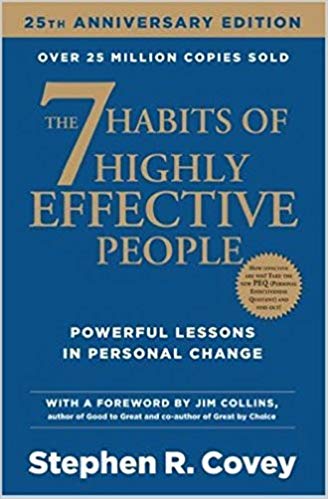

This article is an excerpt from the Shortform summary of "The 7 Habits of Highly Effective People" by Stephen Covey. Shortform has the world's best summaries of books you should be reading.
Like this article? Sign up for a free trial here .
Habit 4: think win/win is all about finding resolutions. Interactions between people constantly include some sort of negotiation, big or small: Where are we going to dinner? What movie are we going to watch? How much will you sell your product for? How much will you buy it for?
Habit 4: think win/win is one of the 7 habits that aims to find a solution that benefits both sides, where everyone is happy with the decision and committed to the plan. People with a habit 4: think win/win frame of mind value cooperation over competition and believe that there is plenty — of money, success, happiness, and good fortune — to go around.
The Six Paradigms of Habit 4: Think Win/Win
There are six paradigms for difficult interactions. It is the goal in habit 4: think win/win to be enabled to enact the win/win paradigm as much as possible. It’s important to recognize when, where, and how to use it. Stephen Covey’s think win/win paradigm can help us do that.
The Win/Win: Everybody is Happy
Reaching a habit 4: think Win/Win resolution can be difficult, and sometimes feels impossible. It often requires you to persist in dialogues longer, even when it feels you’ve reached an impasse. You also must listen carefully and genuinely try to understand the other person’s perspective and goals, then explicitly and respectfully express your own point of view (we’ll go into detail about how to do this in Habit 5). Eventually both parties can reach a solution that neither could have come up with on her own.
The Win/Lose: I Beat You
The Win/Lose paradigm makes everything a competition, making it seem that one person’s success must come at the expense of someone else’s success. Leaders with the Win/Lose mentality use an authoritarian style of leadership; people with this mindset tend to use their authority, power, status, or personality to get what they want.
Most people have a deeply embedded Win/Lose mentality that’s taught early on and reinforced through different life experiences. Sports, school, and sibling rivalries are think win/win examples of deeply embedded forms of the win/lose paradigm.
While there are situations when a Win/Lose approach is appropriate, most of life calls for cooperation, not competition.
The Lose/Win: You Win, I’ll Deal With It
People with the Lose/Win paradigm are more interested in taking the path of least resistance than getting what they want. They generally want to appease and gain acceptance by the other person, and they tend to be intimidated by others’ strengths and shy away from expressing their own wants and feelings. Leaders with this paradigm have a permissive, indulgent style of leadership.
People with a Lose/Win mindset lose not only in their interactions, but also in their own well-being: They tend to suppress a lot of feelings, which can fester and bubble up in anger, resentment, cynicism, and psychosomatic illnesses that can especially affect the respiratory, nervous, and circulatory systems. Recognizing these situations is important to understanding habit 4: think win/win.
Lose/Lose: If I Can’t Win, Neither Can You
When two people with a Win/Lose paradigm get in a standoff, their attitudes can devolve into a vindictive Lose/Lose mentality, meaning that you want the other person to lose so badly that you are willing to take a hit as well. Lose/Lose is the result of getting so focused on the demise of your enemy that you become blind to everything else, including your own well-being. You may also develop a Lose/Lose paradigm if you’re very dependent and have no sense of personal direction, so you think that if you’re unhappy then others should be, too (think: misery loves company). Stephen Covey’s think win/win paradigm advises against the lose/lose paradigm.
Win: Look Out for Yourself
A Win paradigm is different than Win/Lose or Win/Win because it only focuses on your own outcome; if you have a Win mentality, you want to get what you want whether the other person wins or loses. The Win paradigm is an every-man-for-himself mentality — you’re concerned with taking care of yourself, and you expect others to do the same for themselves.
Win/Win or No Deal: Valuing the Relationship
Sometimes a Win/Win resolution is impossible, and it’s better for the relationship if you walk away from a negotiation altogether. If it’s clear that the two parties aren’t going to see eye to eye, or they have entirely different goals and expectations, it can save a lot of tension and problems in the relationship to forego a deal and keep the relationship healthy and options open to collaborate on something else down the road.
This is where the Win/Win or No Deal paradigm comes in: With this framework, you’re determined to find a solution that benefits both parties and, if that’s impossible, you’re at peace with walking away from the deal, knowing that your goals and values don’t align in this situation.
Having the No Deal option in mind as you go into a negotiation prevents you from forcing a deal that will inevitably bring issues later, potentially hurting the relationship. Win/Win or No Deal shows that you value the relationship more than the negotiation. This is especially useful for families and personal relationships, or early stages of business relationships.
Choosing the Right Paradigm
No single paradigm is best for every situation; there will be times when different frameworks are appropriate. The challenge is to have an accurate enough perspective of a situation to determine which paradigm fits best, without just defaulting to what your scripting has ingrained in you.
Of course, you’ll choose different paradigms for different situations. In a sports game, you’ll likely choose a win/lose, but a win/win is best for most interperesonal relatinoships. In fact, Win/Win is generally the only viable option in interpersonal relationships. If both parties don’t win, they both ultimately lose in the long-term effectiveness of the relationship.
Either a Win/Lose or Lose/Win paradigm will bring a short-term win to one party, but the losing side will develop negative feelings that harm the relationship in the long term. In a business dealing, if I get a win in this negotiation, you may walk away and decide you don’t want to work with me in the future. That becomes a loss for me too.
Lose/Lose obviously does nothing to benefit a productive interdependent relationship. And the lack of consideration for the other person in a Win paradigm doesn’t foster the necessary trust and cooperation for an effective interdependent relationship.
Each situation is unique, and while a win/win paradigm is ideal, there may also be situations where a different paradigm is best.
The Five Components of Habit 4: Think Win/Win
A Win/Win paradigm is essential to a successful interdependent relationship, but it’s admittedly difficult; it takes courage, consideration, willingness to learn about the other person, and an ability to influence the other person.
There are five components necessary for a Win/Win paradigm, each creating the foundation for the next: Character, Relationships, Agreements, Systems, and Processes.
Character
Character is the bedrock of a Win/Win paradigm, encompassing three critical traits.
- Integrity — your commitment to “walk the talk” and live out your values and principles — is essential to a Win/Win mindset. If you don’t know what your values are, then you can’t determine what constitutes a win for you in the first place.
- Maturity requires you to balance the courage to express your goals and expectations with the consideration to factor in the other person’s perspective. Courage allows you to pursue the P (what you want) while also maintaining the PC (the relationship)
- An Abundance Mentality reassures you that there is plenty — of success, money, and happiness — for everyone. You can only see the possibility of both people winning if you believe that one person’s success doesn’t come at the expense of the other person’s success.
Relationships
With a strong character foundation, you can use habit 4: think win/win of the 7 habits to build win/win relationships with Emotional Bank Accounts that carry high balances of trust and mutual respect. That trust is essential because you have to believe that the other person respects and cares about you so much that they genuinely want you both to win. Both parties must care enough about each other and the relationship that they’re willing to do the sometimes difficult and tedious work of reaching a mutually beneficial resolution.
When you’re trying to find a Win/Win solution with a person who has a Win/Lose paradigm, focus on the relationship: Make deposits in the Emotional Bank Account, show that you respect and appreciate the other person and her perspective. Don’t be reactive, but rather try to truly listen to and understand the other person. This process is itself a major deposit in the Emotional Bank Account, and eventually the other person may recognize that you genuinely want a Win/Win solution.
Agreements
Once you’ve established Win/Win relationships, you can create Win/Win agreements. Establishing an effective Win/Win agreement entails the five steps we discussed in stewardship delegation.
- Identify the desired results (without dictating the methods to reach them) and deadlines.
- Explain the parameters for achieving the results and warn of potential pitfalls.
- List the resources available — whether human, technical, organizational, or financial.
- Create accountability by setting standards and establishing check-ins.
- Describe the positive and negative consequences of success or failure.
There are four kinds of positive and negative consequences that a manager or parent can impose (as opposed to natural consequences that are beyond either person’s control):
- Financial: bonus, allowance, or penalties
- Psychological: approval, respect, credibility, or loss thereof
- Opportunity: training and benefits
- Responsibility: an increase or decrease in authority
When people know what they’re supposed to achieve (results and accountability) and what will happen if they succeed (consequences) — without being confined to any particular method of getting there — they’re inclined to be incredibly motivated, creative, and innovative in reaching that goal. This can create highly successful think win/win scenarios.
Systems
In order for agreements to be effective, the entire system has to be set up to reinforce the principles in your mission statement: Everything from training to communication to compensation systems need to align with the same values. If you want to embed a Win/Win mentality among your employees, don’t set up office competitions that undermine a spirit of cooperation. Even the most competent employees won’t perform to their full potential in a system that doesn’t support Win/Win.
In one habit 4: think win/win example, Stephen Covey worked with a large real estate company that held annual sales meetings where top performing employees were presented awards. The first time Covey attended, about 40 people received awards — for achievements based on comparisons, like “Most Sales” and “Highest Earned Commissions” — out of the 800 employees at the meeting. Despite all the fanfare, the other 760 people had essentially lost; the company wanted to instill a Win/Win culture, but they had created a Win/Lose system.
Covey worked with the organization to reform the system to reflect a Win/Win paradigm and create a habit 4: think win/win scenario: They developed individual performance agreements that reflected the work and goals of each employee or team, and the following year the company presented awards to about 800 employees out of the 1,000 who attended the annual meeting. These awards recognized associates who met personal and team goals, and as a result everyone was able to celebrate and encourage each other more genuinely because each person’s achievement had been her own, not as a result of someone else’s shortcomings. Stephen Covey’s win/win paradigm proved successful.
Processes
With all the components in place — a character foundation, relationships built from that paradigm, agreements made, and systems in place — how do you actually arrive at a habit 4: think Win/Win scenario?
- Try to understand the issue from the other person’s perspective, reiterating her concerns back to her in an effort to fully understand her goals and concerns.
- Name the most important issues and concerns of both sides. Describe these as objectively and straightforwardly as possible.
- Figure out what results would be agreeable to both parties.
- Determine a third option — beyond either side’s proposition — that can achieve those results.
This same framework is reflected in Harvard law professors Roger Fisher and William Ury’s explanation of principled negotiation, and works as a think win/win example: A principled approach to negotiation focuses on the problem as opposed to the person, creates options that benefit both parties, and uses objective criteria to measure those benefits.
Taking a Win/Win approach to negotiation and problem-solving is a paradigm shift for many people who were embedded with a Win/Lose framework. Use these steps to start practicing Win/Win and the 7 habits in your life.
———End of Preview———

Like what you just read? Read the rest of the world's best summary of "The 7 Habits of Highly Effective People" at Shortform . Learn the book's critical concepts in 20 minutes or less .
Here's what you'll find in our full The 7 Habits of Highly Effective People summary :
- How to prioritize the hundred tasks you have to focus on the one or two that really matter
- The right way to resolve every disagreement and argument
- How to avoid burning out and succeed over 20+ years






